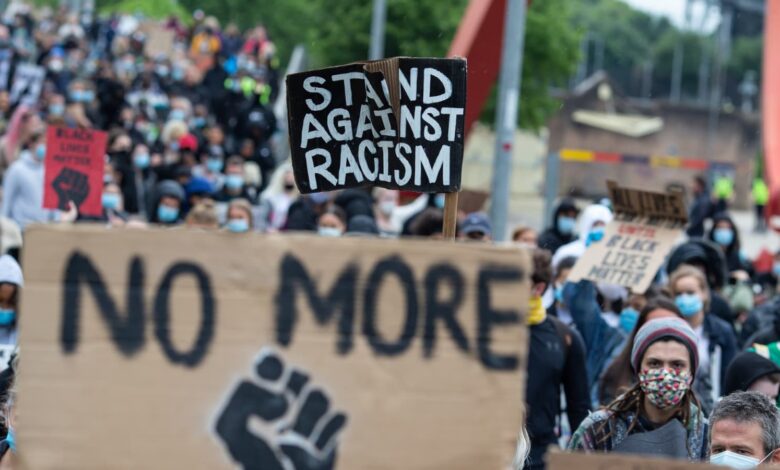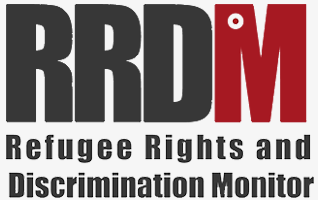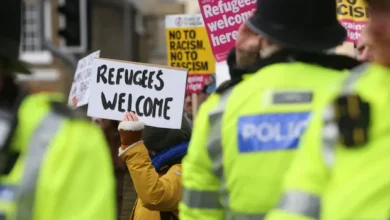Why the West hesitates to condemn racism

BY| Somdeep Sen– aljazeera.
When Josep Borrell recently described Europe as “a garden” and the rest of the world as “a jungle”, there was global outrage. However, it went relatively unnoticed that only a few days earlier many nations in the West also refused to take a public stand against racism.
In October, the United Nations Human Rights Council adopted a draft resolution against racism, xenophobia and intolerance. The resolution described colonialism and slavery as “grave violations of international law”. It asked former colonial and slave-trading states to, among other things, pay reparations “proportionate to the harms [they] committed”.
In all, 32 – mostly Latin American, African and Asian – out of 47 countries voted in its favour. Nine countries voted against the resolution: the Czech Republic, France, Germany, Montenegro, Netherlands, Poland, Ukraine, the United Kingdom and the United States.
In part, their “no” vote is a reminder of the rightward shift in US and European domestic politics that makes even more liberal governments reluctant to accept external scrutiny of their countries’ track records.
The West’s unwavering support of Israel and its apartheid-like policies targeting Palestinians also makes any unequivocal criticism of racism difficult for these countries.
But there’s also a deeper reason: the role that racism and colonialism have played in shaping the current global order. Committing to reparative action for these past crimes could threaten the West’s privileged standing on the global stage.
Racism goes mainstream
Earlier this year, French far-right candidate Marine Le Pen battled President Emmanuel Macron in the second round of the country’s presidential election. She eventually lost, but after her best-ever performance, underscoring the overall shift in that country’s politics.
In 2021, France witnessed a 38 percent increase in anti-Muslim attacks. And earlier this month, a legislator from Le Pen’s party was suspended after he yelled “return to Africa” while Black parliamentarian Carlos Martens Bilongo was criticising the French government’s approach towards refugees.
In the UK, cutting down on immigration has been a priority across the political spectrum. During the 2015 General Elections, the Labour Party sold mugs in its online store that read “controls on immigration”. Meanwhile, the Conservative government in 2020 pushed through a set of laws that closed the country’s borders to those viewed as unskilled and lacking a high level of English language proficiency.
Italy has seen a party with links to neo-fascism come to power recently. Studies in the Netherlands and Germany have confirmed structural racism in everything from the labour market to law enforcement, and education to housing.
And in the US, the rise of white nationalism on display under the Donald Trump administration continues in the form of increasing hate crimes. Several states have passed laws restricting what teachers can discuss on racism, sexism and, in general, systemic inequality in the classroom.
In this climate, European nations and the US are hardly in a position to support a UN mandate for greater accountability on how member states tackle racism.
Backing Zionism
But there’s an elephant in the room: Israel. It is not mere happenstance that both the UK and the US cited their concerns regarding anti-Semitism as a justification for voting against the resolution.
The Human Rights Council resolution makes several references to the Durban Declaration and Programme of Action that was adopted in 2001 at the World Conference against Racism in Durban, South Africa. An early draft of that declaration had equated Zionism with racism. Though the final document balances the Palestinian right to self-determination and statehood with recognition of Israel’s “right to security”, the Jewish state and its Western backers have since insisted that the conference itself was anti-Semitic.
References to the Durban Declaration – which serves as the global template for most nations in the fight against racism – serve as a reminder of the reality that much of the world still does not believe Israel’s treatment of Palestinians is acceptable. But how could Israel’s buddies in the West acknowledge that truth?
A Deeper Problem
Yet it is also vital to recognise that bigotry and prejudice are central to the way the world – in the West’s view – is meant to operate.
Take, for instance, the intellectual foundations of international relations – the discipline of diplomats, politicians, public officials, and policymakers that is concerned with how states interact with each other on the global stage. The writings of its earliest theorists assumed a Darwinian racial hierarchy.
This perspective was palpable in the first international relations textbook, Paul Samuel Reinsch’s World Politics at the End of the Nineteenth Century.
“Large portions of the earth’s surface are in the hands of nations or tribes who are guilty of an under-development of their natural resources,” he wrote. He then suggested the need for an imperial global order and proposed that it was the obligation of the “powerful races” – read white powers – to rule over the “more barbarous or less well endowed with force of mind and character”.
British scholar EH Carr followed with a similarly racist trope in his contribution to An Introduction to the Study of International Relations, where he wrote that Africans were savages and that Indians and Egyptians were immeasurably “less advanced” than Americans and Europeans. Carr then suggested that it was only expected that Europeans – with their truthfulness, integrity, and superior character – would be “leaders of mankind”.
To be sure, the discipline has grown more subtle in its prescriptions for the global order. But a hierarchy persists where a Euro-American perspective remains at the top while the rest are relegated to the margins. It is not without reason that international relations has often been termed a “white man’s” discipline that works to maintain a racialised hierarchy in the world.
It is this worldview that Borrell’s comments last month reflected. After all, as I have argued in my work, the European Union draws on the colonial roots of many of its key member states while dealing with the rest of the world. In fact, the Treaty of Rome that established the European Economic Community as a customs union or the idea of “Eurafrica” – ostensibly a mechanism of interdependence between Africa and Europe – were in fact ways of facilitating the management of colonial territories abroad.
The European Union also presumes inherent superiority in its assertion that “inclusion, tolerance, justice, solidarity and non-discrimination” are central to the European way of life and that the EU is therefore a force for good in international relations.
Racism is a political choice
But ultimately, acknowledging the deep-rooted racism that persists across the world would also require Western nations to apologise sincerely for their past crimes. Instead, they continue to refuse to hold themselves to account.
The UK, in its statement to the UNHCR, said that while the slave trade and colonialism did cause “great suffering”, they did not violate international law. The United States also justified its decision to vote against the resolution, in part, by saying that it did not agree with the need for reparations by former colonial powers.
This refusal to accept present-day racism and xenophobia as a legacy of colonialism and imperialism is a political and moral choice. It is tantamount to standing in favour of racism: Without addressing this history, we cannot repair the society of today.




